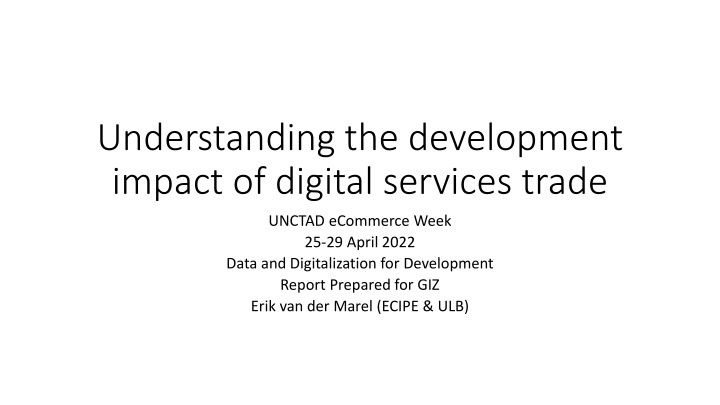Neighbourhood Development and International Cooperation Instrument (NDICI) Mid-Term Review Consultation
This document provides an overview of the Mid-Term Review (MTR) of NDICI, focusing on the Regional Multiannual Indicative Programmes, thematic priorities, and key areas of emphasis for Sub-Saharan Africa. It discusses the objectives, progress to date, and the policy context of NDICI, highlighting key aspects such as democratic governance, peace, sustainable growth, migration, digital transformation, and support measures.
Download Presentation

Please find below an Image/Link to download the presentation.
The content on the website is provided AS IS for your information and personal use only. It may not be sold, licensed, or shared on other websites without obtaining consent from the author.If you encounter any issues during the download, it is possible that the publisher has removed the file from their server.
You are allowed to download the files provided on this website for personal or commercial use, subject to the condition that they are used lawfully. All files are the property of their respective owners.
The content on the website is provided AS IS for your information and personal use only. It may not be sold, licensed, or shared on other websites without obtaining consent from the author.
E N D
Presentation Transcript
Understanding the development impact of digital services trade UNCTAD eCommerce Week 25-29 April 2022 Data and Digitalization for Development Report Prepared for GIZ Erik van der Marel (ECIPE & ULB)
Tremendous growth over the last 15 years The share of global digital services trade in total services has seen a rapid rise of 48 percent between 2005 and 2019. High growth is likely to continue for the next couple of decades. Currently the fourth biggest services sector globally
Benefited all sorts of country (East Asia) Globally, digital services trade has markedly shifted towards East Asia. The East Asia and Pacific region s global share in digital services trade that takes place inside the area has almost doubled from 4.4 in 2005 to 8.5 percent today. European area has lost some global share, from 64 percent to 56 percent.
Effectively increased competitiveness That said, only countries in East Asia, South Asia, and the MENA region have increased their trade competitiveness by reaping effective trade growth, thereby capturing a greater share in global demand for digital services between 2005-19 Growth because of world demand ; not because effective competitiveness
Comparative advantage (against USA benchmark) The MENA region has generated over the years a competitive position in digital services trade with varioud countries in the region now exporting above their potential. Yet, there are trade costs factors that hold back the competitiveness of countries tapping into the ongoing digital services globalization
Trade policy cost factors Data localization and data storage requirements are proven in this report to be a real inhibiting factor to digital services trade, whereas restrictions as part of conditional flow regime have a more ambiguous impact and even positive in some circumstances.
Data-related policies are a threat The threat of data restrictions is real. Today, around 20 percent of global trade in digital services takes place by countries imposing data localization alone, thereby inhibiting global trade. Despite the pivot toward the Asia, the region shows relatively restrictions in cross- border data flows, followed by some African countries.
Data frameworks matter, too Data restrictions are part of a wider governance framework for data, which differs widely across the globe, although the conditional model centred on Europe s approach is leading (cross-border) Open model Conditional model Limited model
Enabling factors matter, too In addition to reforming policies, many countries have still room left to improve their regulatory governance system for digital services trade, such as with respect to regulators. Moreover, digital infrastructure for business by investing in telecom and electricity markets, and improved participation of women in the services economy, will further drive future digital services competitiveness of all regions in the world. Regulators with clear mandate, independence, and human capital / institutional quality will help digital access, too
Conclusion All have benefited from digital services globalization last 15 years MENA, East Asia and surely South Asia stand out Despite pivot towards East, data-related restrictions applied Open regulatory framework seems to benefit winners Does not mean no enabling regulations in place: conditions for data























